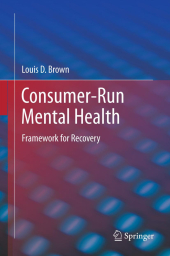 Neuerscheinungen 2014Stand: 2020-02-01 |
Schnellsuche
ISBN/Stichwort/Autor
|
Herderstraße 10
10625 Berlin
Tel.: 030 315 714 16
Fax 030 315 714 14
info@buchspektrum.de |

Louis D. Brown
Consumer-Run Mental Health
Framework for Recovery
2012. 2014. xv, 217 S. 235 mm
Verlag/Jahr: SPRINGER, BERLIN; SPRINGER NEW YORK; SPRINGER 2014
ISBN: 1-489-99165-4 (1489991654)
Neue ISBN: 978-1-489-99165-2 (9781489991652)
Preis und Lieferzeit: Bitte klicken
As consumer-run mental self-help organizations gain in popularity, so they foster international interest. This volume develops the Role Framework, a theoretical model that explains how people engage in and benefit from mental health consumer-run organizations.
Consumer-run organizations and other types of mental health self-help are becoming increasingly popular in the public mental health system. These initiatives now outnumber traditional mental health organizations in the US (Goldstrom et al., 2006). This growth is due in large part to their low cost, devoted supporters, burgeoning evidence base, and increased acceptance by mental health professionals. International interest in these initiatives is also growing as self-help is flourishing in industrialized countries worldwide. I recently edited a special issue on mental health self-help for the American Journal of Community Psychology and we received submissions from five continents, with exciting work coming out of China, Australia, and Europe.
The proposed book develops a rich theoretical model called the Role Framework, which explains how people engage in and benefit from mental health consumer-run organizations (CROs).
Chapter 1 - Introduction.- Defining Qualities of CROs.- History of CROs and Mental Health Care.- Research on the Effectiveness of CROs.- Organizational Dynamics.- Overview of the Book.- Chapter 2 - Using existing theory to build a conceptual framework of consumer-run organizations.- Part 1: Conceptualization of CRO Outcomes.- Part 2: Setting Characteristic Theories.- Part 3: Interpersonal Processes Within CROs.- Part 4: Roles and Identity Theory.- Part 5: The Preliminary Framework.- Chapter 3 - Refining the preliminary framework to create the role framework.- Focused Questions Methodology.- Categories and Causes of Personal Change.- Integrating Categories to Create the Role Framework.- Discussion.- Chapter 4 - Constructing journalistic life history narratives to explore the role of framework.-Conceptual and Epistemological Foundations of Narrative.- Narratives as a Research Methodology.- Integrating Journalism and Ethnographic Research.- Visual Storytelling.- Study Setting - The P.S. Club.- Study Sample.- Participant Observation.- Minimally Structured Interviews.- Life History Construction.- Analysis of Narratives.- Sharing Narratives.- Conclusion.- Chapter 5 - Life history narratives from the P.S. Club.- Life Inside Wellington´s Mental Health System.- Facing Serious Mental Illness, Running a Nonprofit.- Chapter 6 - Using narratives to understand how people benefit from CROs.- Summary Cross-Case Analysis of Life History Narratives.- Limitations and Future Research.- Conclusion.- Chapter 7 - How Organizations Influence Role Development.- Organizational Size.- Leadership Involvement.- Recovery.- Study Hypotheses.- Method.- Results.- Discussion.- Chapter 8 - Role development and recovery.- Role Development and Recovery.- Relating Friendship and Leadership Roles.- Study Overview and Hypotheses.- Method.- Results.- Interpretation of Results.- Promoting an Empowering Environment.- Promoting a Socially Supportive Environment.- Comparing Friendship and Leadership Roles.- Limitations and Future Research.- Conclusions.- General Insights Into the Recovery Process.- Summary Implications for Practice.- Strengths and Weaknesses of the Methods.- Future Research Directions.- Closing Remarks.


